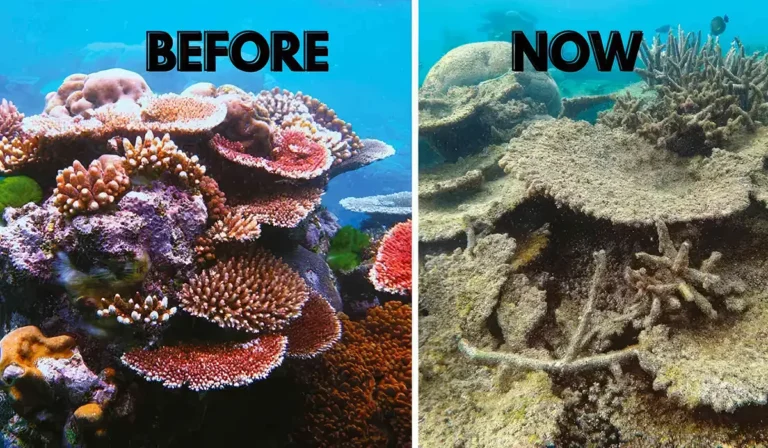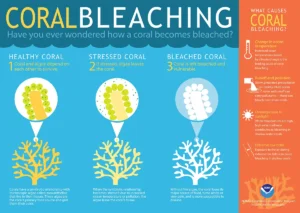Coral Reef Tipping Point Crossed – Emergency Declared!
A landmark 2025 report confirms the world has passed a critical threshold for warm-water coral reefs, shifting the climate conversation from prevention to consequence management.

Key Findings
- The thermal tipping point for warm-water coral reefs, estimated at 1.2°C of global warming, has now been crossed.
- Even stabilizing warming at the 1.5°C Paris Agreement target is now considered insufficient to prevent widespread, long-term dieback of reefs.
- The 2023-2025 marine heatwaves triggered the most extensive mass coral bleaching event ever recorded, providing devastating confirmation of the system's instability.
- The only credible response is to trigger "positive tipping points" in society, such as the rapid adoption of renewable energy and electric vehicles.
Primary Source
Source: Global Tipping Points Report 2025
Author(s): An international consortium of 160 scientists from 87 institutions, led by the University of Exeter's Global Systems Institute.
Have We Reached a Point of No Return?
Imagine a canoe out on the water. You can lean to one side and it will rock, but it always settles back upright. But if you lean just a little too far, the boat suddenly flips over. It reaches a tipping point, and it will not return to its normal state without a massive effort.1Keating, C., McSweeney, R., & Tandon, A. (2025, July 8). Tipping points: Window to avoid irreversible climate impacts is ‘rapidly closing’. Carbon Brief. https://www.carbonbrief.org/tipping-points-window-to-avoid-irreversible-climate-impacts-is-rapidly-closing/ A group of the world’s top scientists has just announced that a vital part of our planet has flipped its canoe.
In a landmark report, scientists have declared that the world’s warm-water coral reefs have been pushed past a critical and likely irreversible tipping point.2EurekAlert! (University of Exeter). (2025, October 12). ‘New reality’ as world reaches first climate tipping point. https://www.eurekalert.org/news-releases/1100601 This is the first time a major planetary system has officially crossed such a threshold, signaling a stark new reality in our changing climate.3Koumoundouros, T. (2025, October 13). Mass Coral Die-Offs Confirm First Breach of a Major Climate Tipping Point. ScienceAlert. https://www.sciencealert.com/mass-coral-die-offs-confirm-first-breach-of-a-major-climate-tipping-point The conversation is no longer about a future risk. It is about managing the consequences of a collapse that is already happening.4Jones, R. (2025, October 12). The World’s First Climate Tipping Point Has Been Crossed, Scientists Say. TIME. https://time.com/7325086/coral-reef-climate-tipping-point-crossed/
What Is the Evidence for This Collapse?
The report’s conclusion is built on clear and overwhelming evidence. Scientists calculated that the tipping point for coral reefs was around 1.2°C of global warming above pre-industrial levels.5Perry, C., et al. (2025). Considerations for determining warm-water coral reef tipping points. Earth System Dynamics, 16(1), 275-292. https://esd.copernicus.org/articles/16/275/2025/ Our planet has already warmed by about 1.3°C, pushing us past that critical line.6This is Oxfordshire. (2025, October 13). First climate tipping point reached after coral reef diebacks, scientists warn. https://www.thisisoxfordshire.co.uk/news/national/25537065.first-climate-tipping-point-reached-coral-reef-diebacks-scientists-warn/ We are now seeing the real-world results of crossing that boundary.
The intense marine heatwaves between 2023 and 2025 caused the largest mass coral bleaching event ever recorded. It affected over 80% of the world’s reefs in at least 83 countries.7NOAA Coral Reef Watch. (2025, September 20). Fourth Global Coral Bleaching Event. https://coralreefwatch.noaa.gov/satellite/research/coral_bleaching_report.php Scientists are now over 99% certain that our reefs will enter a state of long-term dieback. This will happen even if we manage to hit the ambitious 1.5°C warming target.
How Can an Entire Ecosystem ‘Tip Over’?
What Does ‘Coral Bleaching’ Mean?
A coral’s beautiful color comes from a partnership. The coral itself is an animal called a polyp. It builds a hard skeleton. Inside its tissues live microscopic algae called zooxanthellae.8Great Barrier Reef Foundation. (n.d.). Coral Bleaching 2025: What It Means for the Reef. Accessed October 13, 2025, from https://www.barrierreef.org/the-reef/threats/coral-bleaching Think of it like a landlord and a tenant. The coral (the landlord) provides a safe home. In return, the algae (the tenant) pays rent by providing up to 90% of the coral’s food through photosynthesis.
This partnership is very sensitive to heat. When the ocean gets too warm, the algae start to produce toxins. They become destructive tenants. In a desperate act to save itself, the stressed coral evicts the algae. Without its colorful tenants, the coral’s transparent tissue reveals its white skeleton. This is coral bleaching. A bleached coral is not dead, but it is starving to death.9NOAA National Ocean Service. (n.d.). What is coral bleaching? Accessed October 13, 2025, from https://oceanservice.noaa.gov/facts/coral_bleach.html

When ocean temperatures rise, corals expel the microscopic algae (zooxanthellae) living in their tissues, causing them to turn completely white. Credit: NOAA
How Did We Get Here?
Widespread bleaching events like this were almost unheard of before the 1980s. Since then, they have become more frequent and much more severe. Global mass bleachings occurred in 1998, 2010, the mid-2010s, and again in 2023. The Great Barrier Reef, for instance, has bleached six times in the last ten years alone.
A healthy reef needs about 10 to 15 years to recover from a bad bleaching event.10Great Barrier Reef Marine Park Authority. (n.d.). Coral Bleaching. Accessed October 13, 2025, from https://www2.gbrmpa.gov.au/learn/reef-health/coral-bleaching That recovery window has now vanished. The system is being hit by intense stress again and again before it has a chance to heal. This constant, relentless pressure is what pushed it past the tipping point.
Why Does Losing Coral Reefs Matter to Us?
The collapse of coral reefs is more than just sad. It is a direct crisis for all of humanity. These “rainforests of the sea” cover less than 1% of the ocean floor, but they are essential for both the planet and people.11UNEP. (2021). Visual Feature | Status of Coral Reefs of the World. https://www.unep.org/interactive/status-world-coral-reefs/
- They are biodiversity hotspots. Reefs provide a home for about 25% of all known marine species.
- They support people. Nearly one billion people depend on coral reefs for their food, jobs, and protection from storms.
- They are economic engines. Reef tourism and fishing generate over $44 billion every single year.12Gill, D. A., et al. (2022). Coral Reef Deterioration and Livelihoods of Coastal Communities: An Economics Perspective. ResearchGate. https://www.researchgate.net/publication/363785619_Coral_Reef_Deterioration_and_Livelihoods_of_Coastal_Communities_An_Economics_Perspective
- They are natural shields. Reefs act as barriers that prevent an estimated $94 billion in flood and storm damage each year.13Coral Vita. (n.d.). The Economic Impact of Coral Reef Loss. Accessed October 13, 2025, from https://coralvita.co/coral-cafe/economic-impact-of-coral-reef-loss/
Is There Any Hope Left?
The authors of the report say this is a moment for urgent action, not despair.14Readfearn, G. (2025, October 13). Planet’s first catastrophic climate tipping point reached, report says, with coral reefs facing ‘widespread dieback’. The Guardian. https://www.theguardian.com/environment/2025/oct/13/coral-reefs-ice-sheets-amazon-rainforest-tipping-point-global-heating-scientists-report The core of their report is not just about the problem. It is about a new type of solution. They want us to deliberately trigger a cascade of “positive tipping points.”15Lenton, T. M., et al. (2025). Global Tipping Points Report 2025 – Summary. University of Exeter. https://global-tipping-points.org/download/1419/ These are rapid, self-reinforcing shifts in our own society that can drive down carbon emissions faster than ever before.
We are already seeing some of these positive tips happen. In many places, solar and wind power are now cheaper than fossil fuels, which drives faster adoption.16Lenton, T. (2024, July 1). Positive tipping points can save our climate. Here’s how. World Economic Forum. https://www.weforum.org/stories/2024/07/positive-tipping-points-climate-tim-lenton/ As more people buy Electric Vehicles, batteries become cheaper. This in turn makes renewable energy storage more affordable, creating a powerful positive feedback loop.17University of Exeter. (n.d.). Positive Tipping Points. Accessed October 13, 2025, from https://www.exeter.ac.uk/research/tippingpoints/
The report delivers a very clear message. The time for slow, small changes is over. The planet’s oceans have sent us a warning. The fate of other major systems, like the Amazon rainforest and the great ice sheets, may depend on whether we listen to the silent, ghostly message from our dying coral reefs.



